A cloud-based queue management system software is a digital solution that helps businesses efficiently manage customer queues, appointments, and service requests in a cloud-based environment. This software automates and streamlines the queuing process, allowing organizations to enhance customer experience, optimize resource utilization, and improve operational efficiency. In this article, we will explore the key features, benefits, and considerations of a cloud-based queue management system software.

Key Features of Cloud-Based Queue Management System Software
- Queue Management: The software allows businesses to create, manage, and monitor customer queues in real-time. Customers can join the queue remotely through online portals or mobile apps, reducing wait times and improving customer satisfaction.
- Appointment Scheduling: Businesses can enable customers to schedule appointments for services or consultations through the software. This feature helps in better resource planning and ensures a smoother flow of customers.
- Digital Signage: The software can display digital signage with queue information, service updates, and promotional messages to keep customers informed and engaged while waiting.
- Customer Notifications: Automated notifications via SMS, email, or mobile app alerts can keep customers informed about their queue status, estimated wait time, and service availability.
- Reporting and Analytics: The software provides insights into queue performance, customer flow, wait times, and service efficiency through detailed reports and analytics dashboards.
- Integration Capabilities: Cloud-based queue management systems can integrate with CRM systems, communication tools, appointment scheduling software, and other business applications to streamline operations and improve customer engagement.
Benefits of Cloud-Based Queue Management System Software
- Improved Customer Experience: By reducing wait times, providing self-service options, and offering personalized services, businesses can enhance the overall customer experience and satisfaction.
- Optimized Resource Utilization: Efficient queue management helps businesses allocate resources effectively, reduce idle time, and maximize staff productivity.
- Enhanced Operational Efficiency: Automation of queuing processes, appointment scheduling, and customer notifications streamlines operations and reduces manual tasks for staff.
- Data-Driven Decision Making: Access to real-time data and analytics enables businesses to make informed decisions, identify bottlenecks, and implement improvements for better service delivery.
- Scalability and Flexibility: Cloud-based solutions offer scalability to accommodate growing business needs and flexibility to adapt to changing customer demands and operational requirements.
Considerations for Implementing Cloud-Based Queue Management System Software
- Security and Compliance: Ensure that the software complies with data protection regulations and industry standards to safeguard customer information and maintain trust.
- User Training and Support: Provide adequate training to staff members on using the software effectively and offer ongoing support to address any issues or concerns.
- Customization and Integration: Evaluate the software’s customization options and integration capabilities to align with your business processes and existing technology infrastructure.
- Cost and ROI: Consider the cost of implementing and maintaining the software against the expected return on investment in terms of improved customer satisfaction, operational efficiency, and revenue growth.
A cloud-based queue management system software offers businesses a modern and efficient way to manage customer queues, appointments, and services effectively. By leveraging digital solutions for queuing processes, organizations can enhance customer experience, optimize resource utilization, and improve operational efficiency in today’s competitive business landscape.
Overviews of the 11 Cloud Based Queue Management Systems
SEDCO
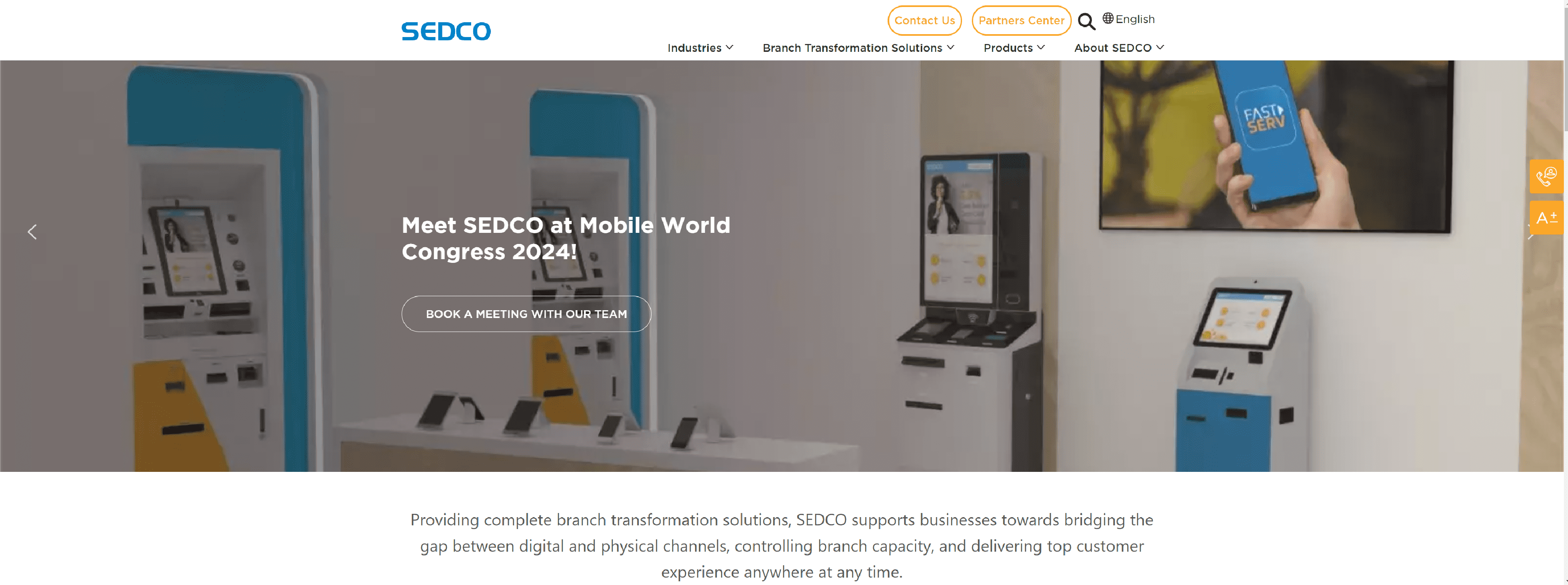
SEDCO cloud-based queue system is a cost-effective solution that does not require a dedicated server or hardware in premises to manage queues.
- Reduce customer wait and service time
- Increase customer happiness level
- Ensure a seamless customer journey
- Optimize staff performance and productivity
- Boost your revenue with cross-selling
- Measure performance and drive operational efficiency
- Control branches and queues remotely in real-time
- Easy integration your back-end systems
QWAITING
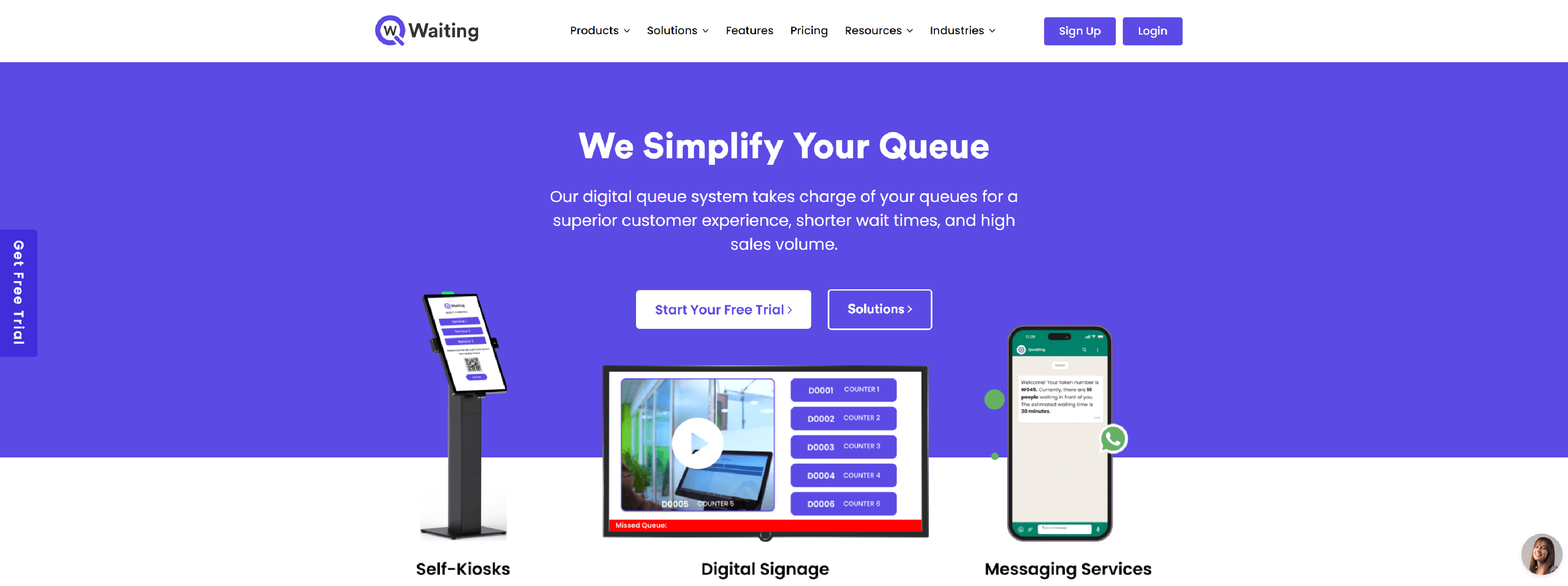
Qwating queuing software used in different industries to manage the Queues of people, reduce waiting time & walk-in services, build strong relationships.
- Banking Queue System
- Educational Queue System
- Hospital Queue System
- Public Sector Queue System
- Retail Queue System
- Hardware Products
WAVETEC
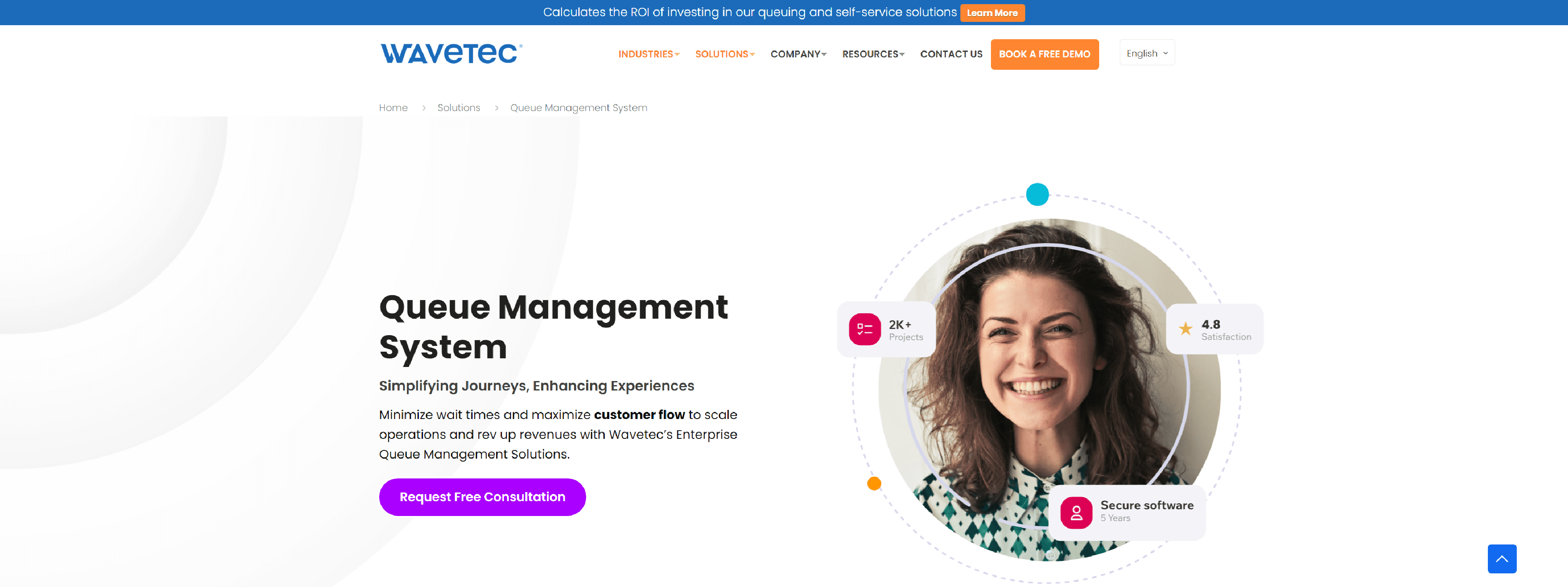
Wavetec is a global leader in digital transformation services. We offer innovative digital solutions to modernize your business and optimize customer journeys.
QUEUERITE
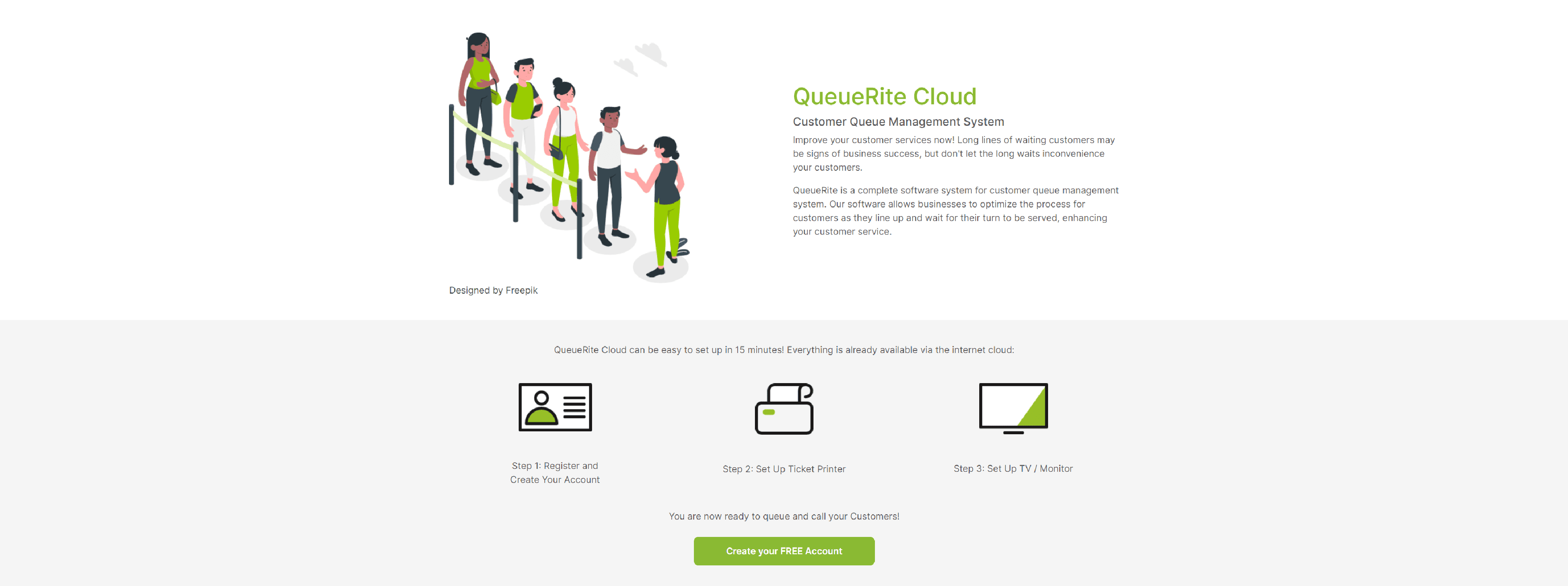
Queuerite cloud-based web customer queue management system developed using Java software technologies.
- Banking and Finance Institutions
- Medical, Health Care and Diagnostic Centers
- Government Agencies
- Airline and Shipping Companies
- Colleges and Universities
- Manpower Training Centers
SKIPLINO
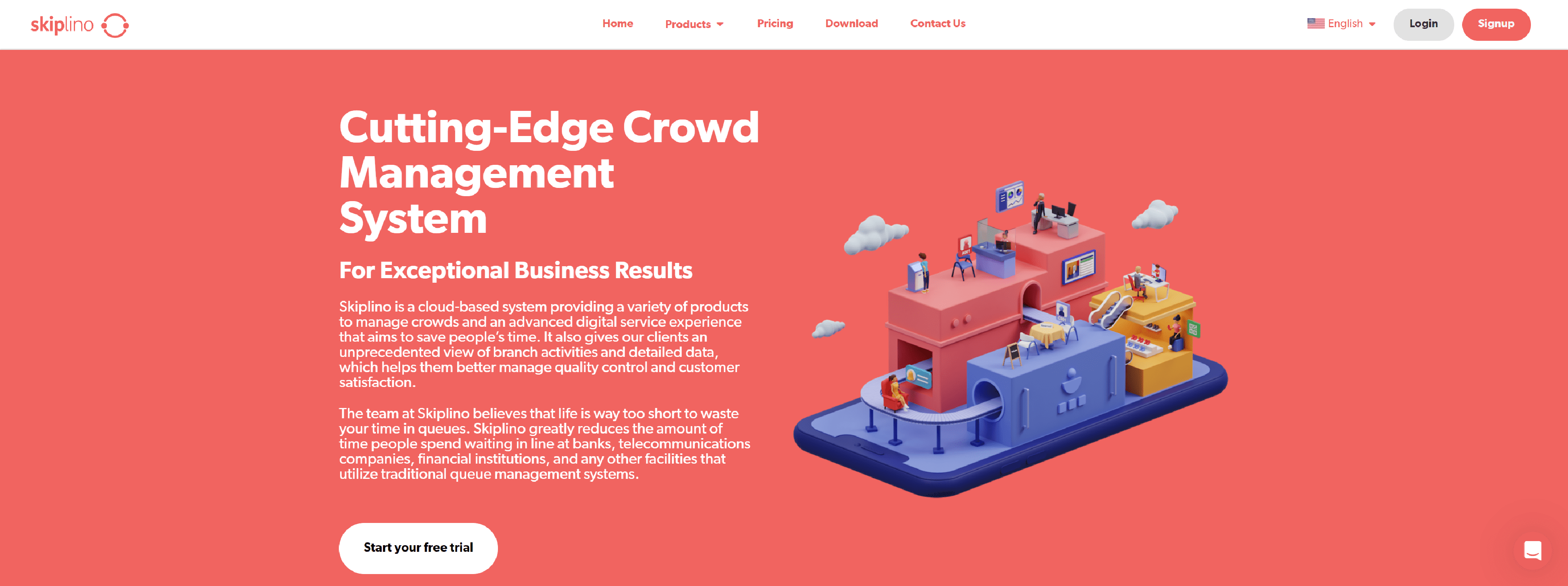
Skiplino – A smart Queue Management System for queuing customers and gather their feedback, monitor real-time information and speed of services.
- Quick And Easy Setup Process
- Convenient Central Account Management
- Online Booking
- Advanced Reporting
- Receive SMS And Push Notifications
QUEBERRY
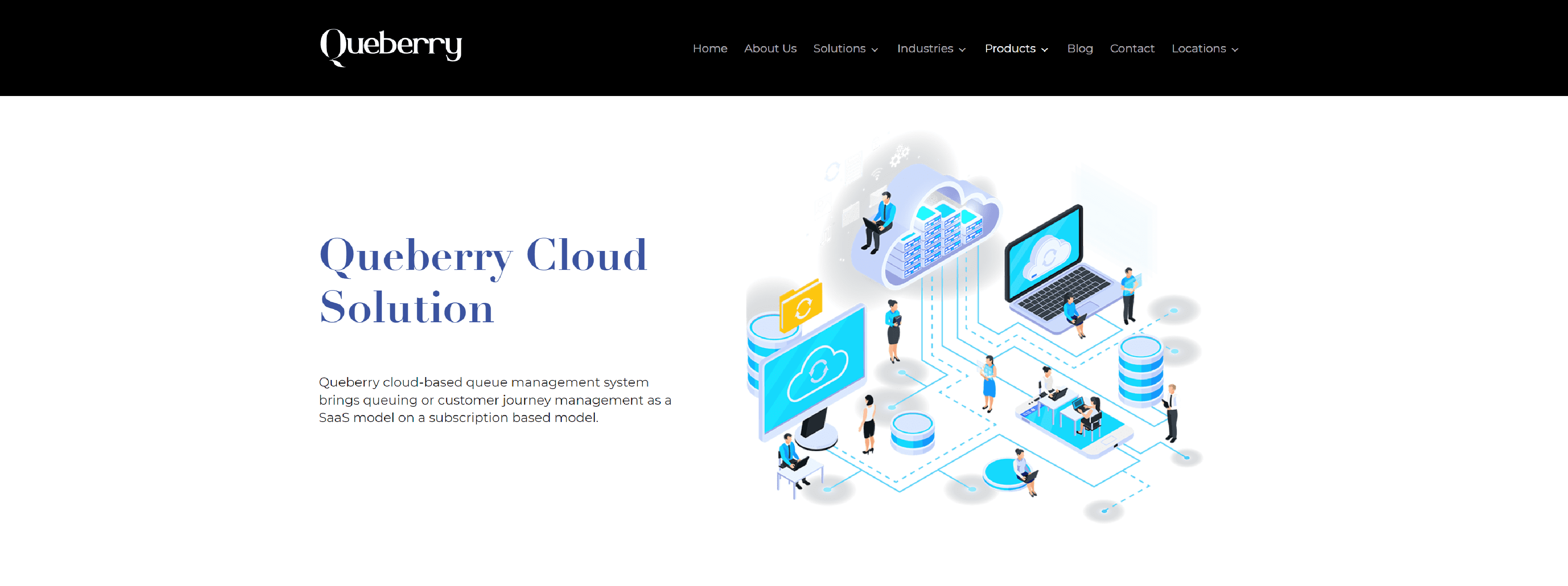
Queberry Cloud-Based Queue Management System offers your customer journey and queuing solution. Your plan selection will include security and software maintenance.
- SAAS – Managed
- Private Cloud Support
- Azure & AWS
- Multi-branch Solution
- Scalability and Easy Integration
- Free Release Upgrades
VIRTUAQ
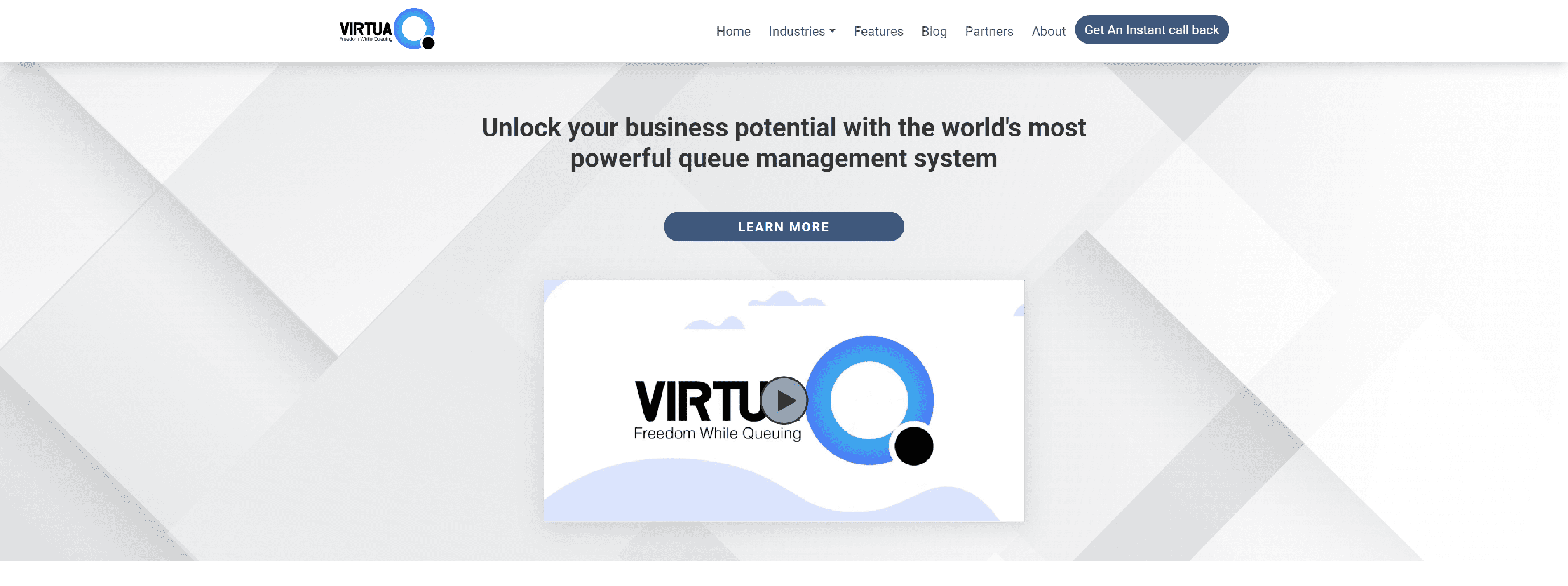
VirtuaQ is a smart queue management system for hospitals, banks and government.
- Reduce waiting time
- Improve customer experience
- Act on real-time data
- Installation
QTRAC
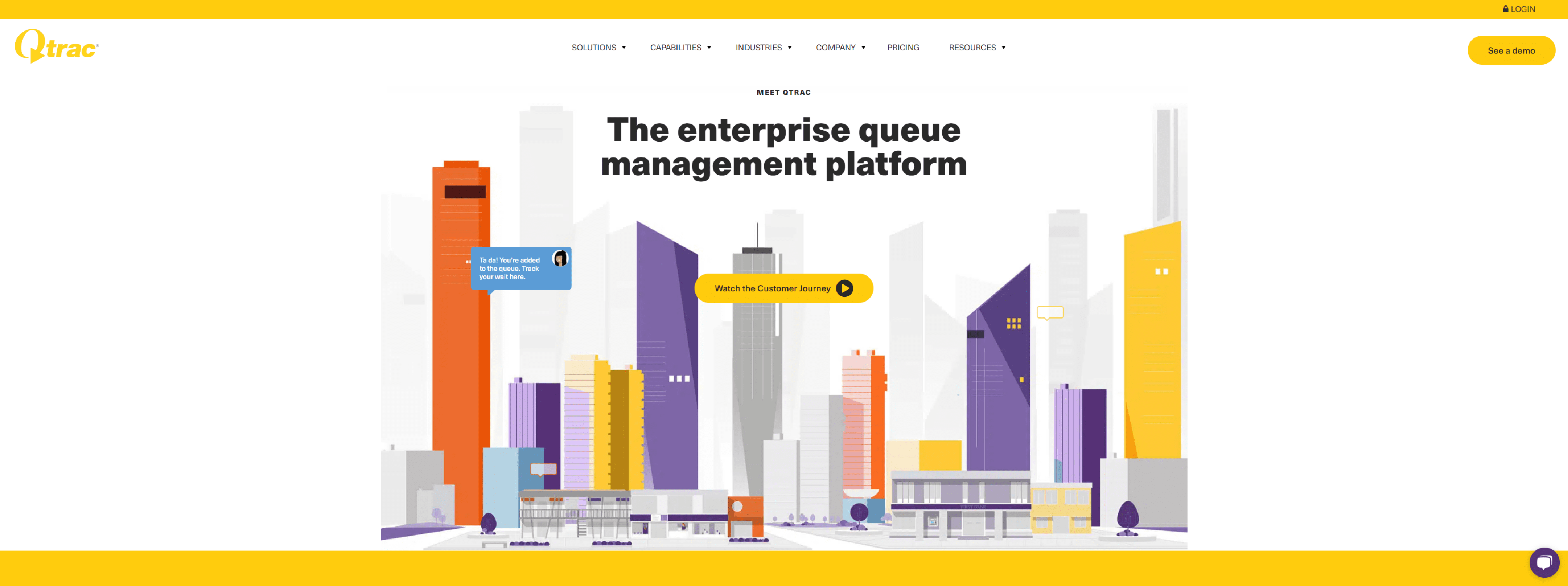
Qtrac, a world-leading queue management system featuring virtual queuing technology and appointment scheduling software.
- Eliminate lines and crowds with Virtual Queuing
- Manage capacity with Appointment Scheduling
- Engage and connect with Mobile Queuing
- Gather insight with Reporting and Analytics
- Future-proof with an agile Tech Stack
- Ensure success with world-class Support
GREETLY
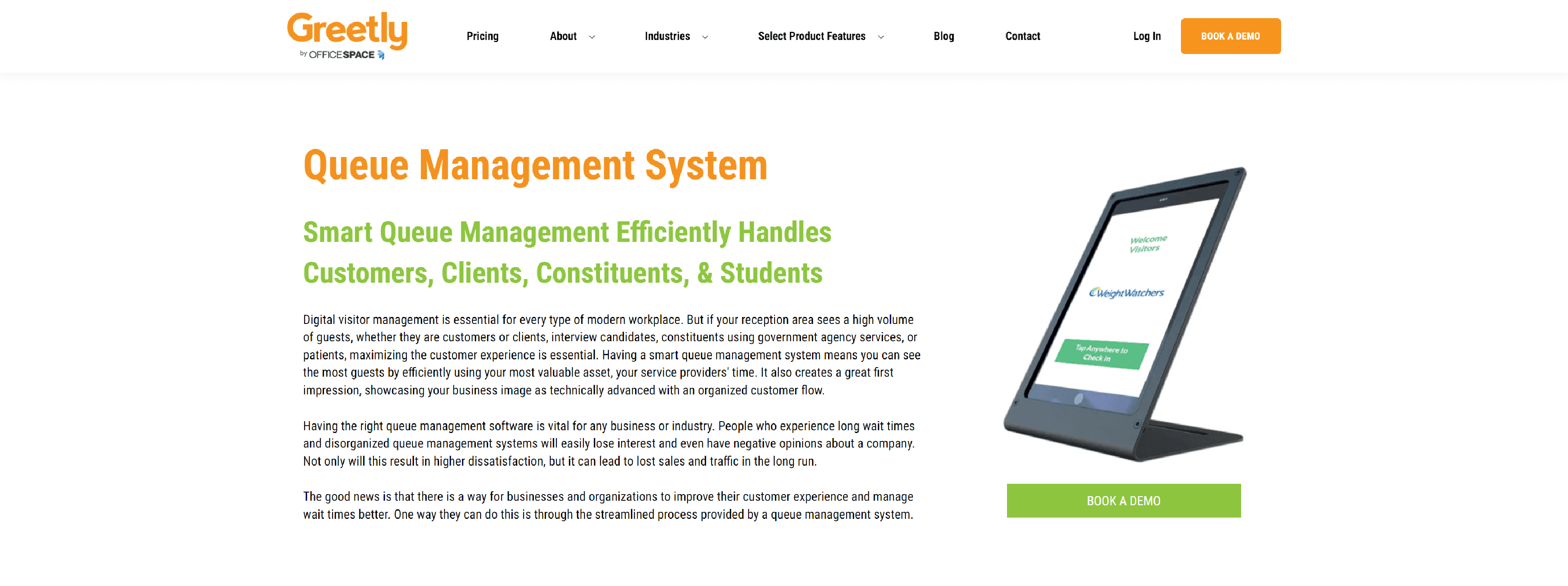
Greetly – Award-winning visitor management and check-in software with instant notifications, photos, badges, & more.
- Integrated process
- Readily scalable
- Multi-lingual support
- Improved data collection
- Self-help features
- Data security
QMATIC
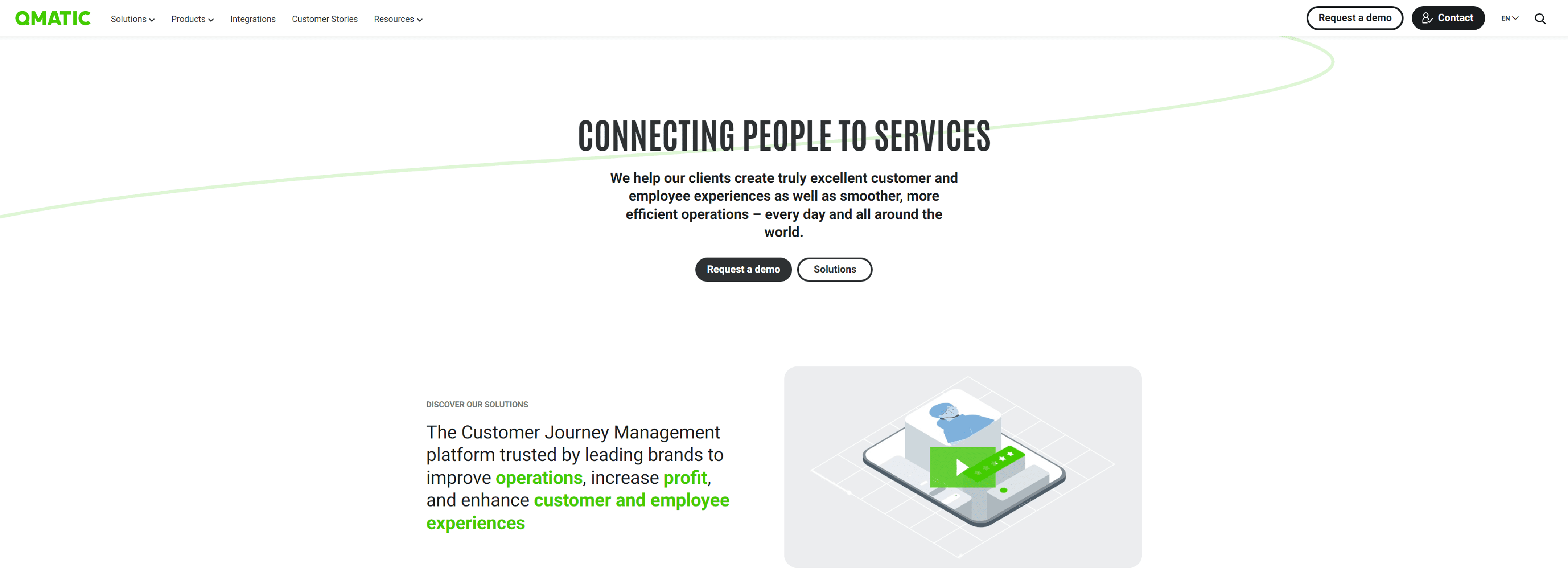
Qmatic is a global leader in customer journey management. We manage over two billion customer journeys each year, across more than 65,000 systems worldwide.
- Appointment management and resource capacity planning
- Checking in appointments and managing visits
- Calling and serving waiting customers
- Monitoring and reporting
VISITNINJA
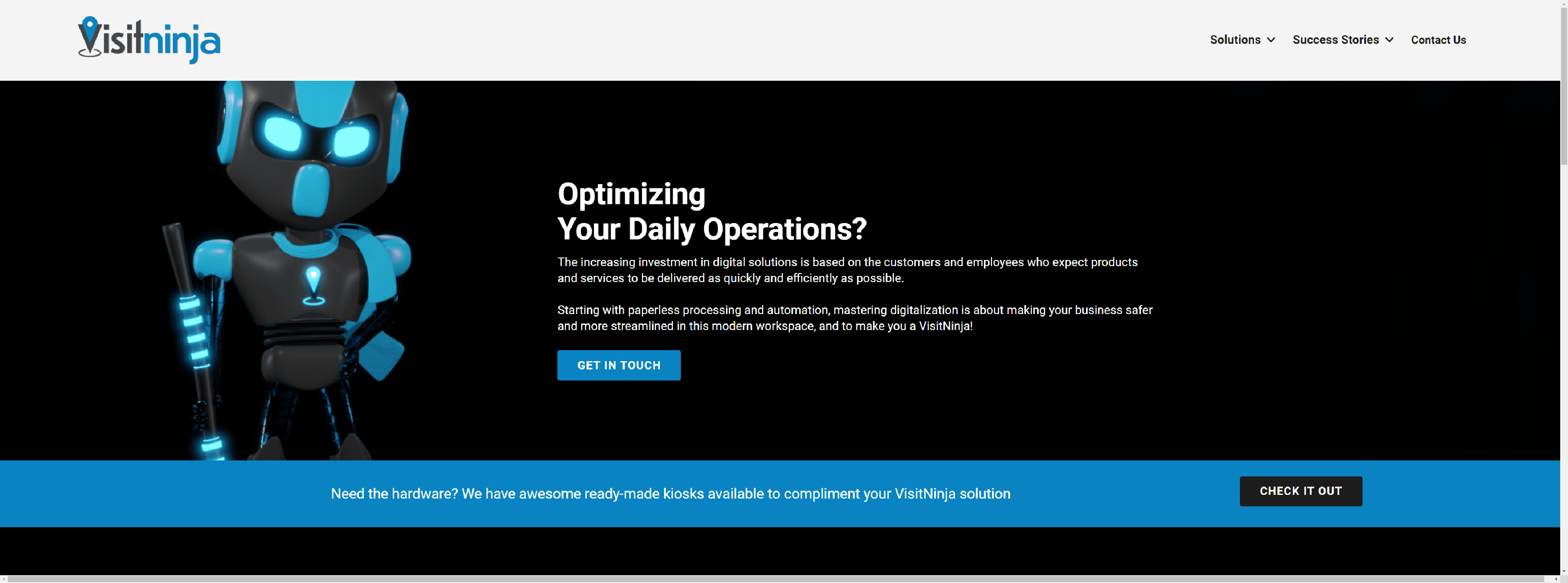
VisitNinja Cloud Queue Management Solution, proudly made in South Africa is an affordable and simple way of bringing order to your waiting area.
- Cloud Queue Management is web-based – it’s as simple as logging in to a website on your own hardware
- Create a relaxed environment and reduce pressure on visitors and staff by providing an easy and fair way to queue
- Display useful information and/or advertising to your waiting visitors, keeping them informed or entertained while they wait (optional)
- Continuously measure and improve your visitors’ queuing experience with reporting and instant alerts
What are the common pricing models for Cloud Based Queue Management System Tools?
The pricing models for cloud-based queue management system tools can vary depending on the provider and the features included in the software. Here are some common pricing models you may encounter:
Subscription-based Pricing:
Many cloud-based queue management systems offer a subscription-based pricing model, where businesses pay a recurring fee (monthly or annually) to access the software. The subscription fee typically includes access to the software, updates, customer support, and sometimes additional features based on the subscription tier.
Per-user Pricing:
Some providers charge based on the number of users who will be using the queue management system. Businesses pay a fee for each user license, allowing a specific number of employees to access and use the software.
Tiered Pricing:
Tiered pricing involves offering different pricing plans with varying levels of features and functionalities. Businesses can choose a plan that aligns with their needs and budget, with higher-tier plans often including more advanced features and support.
Pay-per-Use Pricing:
Pay-per-use pricing models charge businesses based on their usage of the queue management system. This could include metrics such as the number of customers served, appointments scheduled, or transactions processed. Businesses pay for the actual usage of the software.
Custom Pricing:
Some providers offer custom pricing based on the specific needs and requirements of the business. Custom pricing allows businesses to tailor the features and services included in the software package, with pricing determined based on these customizations.
Add-on Pricing:
Add-on pricing models involve charging additional fees for extra features or integrations that are not included in the base package. Businesses can choose to add specific functionalities to their queue management system for an additional cost.
Free or Freemium Models:
Some providers offer free versions of their cloud-based queue management systems with limited features or capabilities. Businesses can upgrade to a paid plan for access to more advanced features and support. Freemium models provide a basic version for free and charge for premium features.
When evaluating cloud-based queue management system tools, it’s essential to consider the pricing model that best fits your business needs, budget, and expected usage. Compare different providers, their pricing structures, and the features included to make an informed decision that aligns with your requirements.
Most Common Questions Regarding Cloud Based Queue Management System (FAQs)
What is a cloud-based queue management system?
A cloud-based queue management system is a digital solution that helps businesses manage customer queues, appointments, and service requests in a cloud-based environment. It automates and streamlines the queuing process to enhance customer experience and operational efficiency.
How does a cloud-based queue management system work?
The software allows customers to join queues remotely through online portals or mobile apps. It provides real-time queue monitoring, appointment scheduling, digital signage displays, customer notifications, and reporting and analytics capabilities to optimize queue performance and resource utilization.
What are the benefits of using a cloud-based queue management system?
The benefits include improved customer experience, optimized resource utilization, enhanced operational efficiency, data-driven decision making, scalability, and flexibility. The software helps businesses reduce wait times, increase staff productivity, and make informed decisions to drive better service delivery.
Is a cloud-based queue management system secure?
Cloud-based queue management systems typically adhere to data protection regulations and industry standards to ensure the security and privacy of customer information. It is essential to choose a reputable provider with robust security measures in place to protect sensitive data.
Can a cloud-based queue management system integrate with other business applications?
Yes, cloud-based queue management systems can integrate with CRM systems, communication tools, appointment scheduling software, and other business applications to streamline operations and improve customer engagement. Integration capabilities enhance the software’s functionality and compatibility with existing systems.
How can a cloud-based queue management system help businesses improve operational efficiency?
By automating queuing processes, appointment scheduling, and customer notifications, businesses can reduce manual tasks, optimize resource allocation, and enhance staff productivity. Real-time data and analytics provide insights for better decision making and operational improvements.
What factors should businesses consider when implementing a cloud-based queue management system?
Businesses should consider factors such as security and compliance, user training and support, customization and integration capabilities, cost and return on investment (ROI), scalability, and alignment with business processes. Evaluating these factors ensures successful implementation and utilization of the software.
Is training provided for staff members on how to use the cloud-based queue management system?
Many providers offer training sessions for staff members to learn how to effectively use the software. Training ensures that employees understand the features and functionalities of the system to maximize its benefits and improve operational efficiency.